The last pandemic of this magnitude was the 1918 Spanish flu. What better way to recreate the entertainment of that era then watching black-and-white silent films, complete with a live organ or piano player accompanying, as cinemas employed back then?
That’s the idea behind Tulsa’s Circle Cinema silent film series, held on the second Saturday of every month, featuring live organ accompaniment from local performer Bill Rowland. Starting in July 2014 with 1927’s Chasing Choo Choos, the program had grown from about 30 attendees initially to about 150 attendees per screening.
When the COVID-19 coronavirus shutdown hit in mid-March, like everybody else Circle Cinema was uncertain how to proceed. “We were brainstorming different ideas for how to keep offering film and bring in technology to our community, so they can still feel like they’re a group collecting together,” says programming director Chuck Foxen.
They decided to continue the silent film series on YouTube, hoping not only to maintain their existing audience but also to attain new viewers nationwide. A public domain film would take up most of the screen, with Rowland performing a live accompaniment from home on piano, shown through a simultaneous picture-in-picture in the corner.
On Saturday, April 11, the digital version of the series premiered with the 1922 Buster Keaton comedy Cops. The 20-minute short follows Keaton’s character as he tries to strike it rich to impress a woman, but increasingly bizarre hijinks ensue, culminating in the protagonist accidentally setting off a bomb during a parade.
“A very small number of those movies actually had scores written for them,” Rowland explains. “Very often they got a cue sheet for the movie, with suggestions for tunes that might be used for accompaniment. In a small theater, they would have a piano. In a larger theater, they would have an organ, which can reach a much louder sound. In some of the biggest theaters, they would have a 12-piece orchestra!”
Playing on his home 1922 piano to mirror the 1922 movie, Rowland largely improvised his accompaniment. But having watched the film previously to prepare, there were a few specific musical cues he made sure to include.
- At 13:59, Rowland hits a loud low “thud” sound on the piano when a bomb explodes.
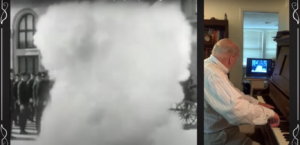
- At 17:18, Rowland plays a whimsical flourish when two policemen, both trying to hit Keaton’s character with a whacking stick, accidentally knock each other out instead.
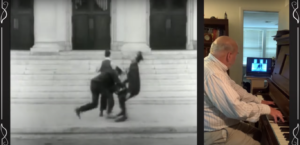
- At 18:16, Rowland slides his right hand down the entire length of the piano when Keaton’s character falls down from a building and knocks over a passing businessman.
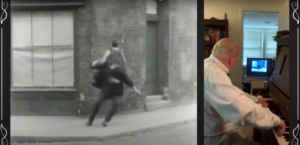
Not just anybody is up to the task. Rowland serves as president for the Oklahoma chapter of the American Theatre Organ Society, which holds a similar series with silent films each summer. “It’s like pulling teeth to get people to volunteer for it,” Rowland admits. “They don’t feel well-equipped. I can improvise a score, but organists used to do this all day, every day.”
As of this writing, the YouTube version has notched 359 views and counting—from all over the country, not just Tulsa. That’s about double what the live show was previously attracting.
The live chat and comments section also revealed cinematic insights. A YouTube commenter noted that a scene with a window sign reading “Dr. Smith, Goat Gland Specialist” was a timely reference to John R. Brinkley, at the time a notorious quack doctor promoting transplantation of goat testicles into humans to cure male impotence. The sly reference would have been considered incredibly risqué at the time.
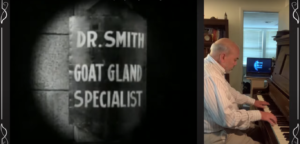
The cinema also used the live stream to help raise funds. “We asked on the live chat if anyone was able to give donations,” said Foxen, “and some were.”
What’s coming up next? On Saturday, May 9, they plan to live stream one of two movies that were made with all-black casts for all-black audiences, in the era when cinemas were segregated: either 1920s Within Our Gates or 1929’s The Scar of Shame.

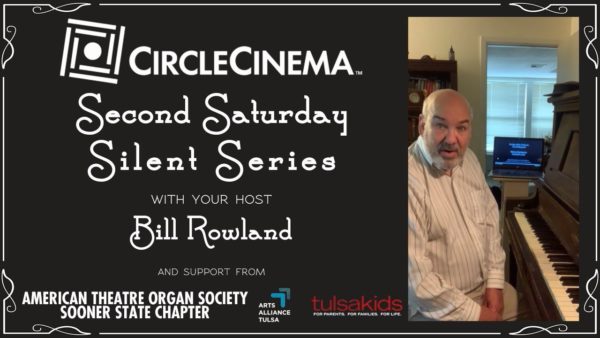

Share this post